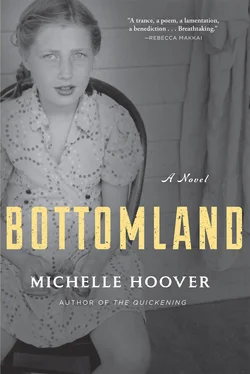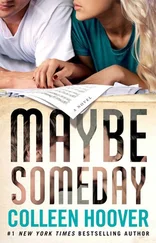A whistle sounded above my head. I ducked into an alley to make it less. Minutes later, every door in the yard opened and out they rushed. Noon break. I stayed in the alley to let the men pass. Their hair was thick with a sticky kind of dust, their faces too. They walked and rubbed their eyes as if they didn’t have time enough. Soon the yard emptied, all but a circle of men standing for a smoke. They gave me a look and I nodded. They didn’t nod back. Not one of them seemed ready for talking. Least about two missing girls.
A hard place. Harder than I’d thought. The sun was high but the streets felt cold as knuckles. A whistle went off, my ears a drum, and the men filed in. Long through the afternoon I watched for another break, tracing one block after the next. At a store, I bought a spot of bread. Some cheese and a pickle. The man who sold it wore an apron over his front, and he dropped the change in my fingers like so much trash. “Here on business?” he asked. I thought of pulling the posters out, but the man only frowned.
“Just seeing the place,” I said.
“Best you keep to the Loop. Only workers here and only on breaks. We price for them. With the factories’ help. The unions don’t like a spare man wandering around, buying up someone else’s bread.”
I let myself out. When I looked back, the man stood at his window, arms crossed.
The afternoon was getting late. That whir from the factories, it never did let up. The light between the buildings grew heavy and still it was cold. It was colder when a person wasn’t working, only walking about. The city was more than wind. Ugly with the sound. The pictures in the magazines, they’d looked washed clean. But here the streets were something different. They flattened every hill, constant as netting. And that dust, thick in the men’s ears, thick in their hankies. Worse than any chaff in the barn. Finally, the whistle sounded again. A stream of men and women broke around me as if I was a stone. I couldn’t get up my voice to ask questions, not with those faces. And not a one of them looked like my sisters, uniforms or not. In only minutes the workers were gone again. Then it was dark.
I hadn’t thought about night. I didn’t know where to take myself. Boarding, that’s what Father had done. Helen had said the same. But a knock on one door after another and they didn’t have room. “We’re only for workers,” a woman said. I walked farther, leaving the yards behind, and knocked again. “Too late,” the last said. He was an old man, suspenders holding up his trousers. He hugged a hard role of salami in his fist and took a bite. “You’d do better tomorrow,” he said. “If we lost a man or another, there’d be room. There’s a George here, he might go. He might not.” He eyed me close. The smell of that salami, it got my stomach going. “You look like a tidy one at least,” he said, chewing. “Not like these others. Is that right?”
“Yes sir. I suppose.” A doughboy face, Esther used to say. After the war, I wondered if it still was. “But I don’t know the others, sir.”
The man laughed. “You’re a funny one. Remind me of my brother. Quiet like that. Look, if George leaves, there’s a room to share. At seventy-five cents a night. Supper for seventy-five more if you want it. The missus does a fair spread. That’s all I got.”
I tipped my hat. “You’re a sure help,” I said. After blocks of walking, I found a street alley cleaner than most, near to dry, and I threw my blanket out. The alley was just wide enough to stretch my legs. A bit of dirt, something softer than bricks. I counted my bills, couldn’t see numbers. Twenty-six, it felt. Twenty-six dollars. At seventy-five a night, seventy-five for supper, I could make it two and half weeks. More if the alley worked all right. I had my return ticket. And I had two extra for the girls. Already I’d imagined it, opening a door and there they’d be, Esther and Myrle. Lee , they’d sing out. I could be a George if the man wanted. I could be anyone. That’s what I knew in France when I stepped off the boat. It was different than sleeping next to Ray and pretending at being alone. The boys had already made a name for me before we’d shipped out. Hush .
I turned on my side. A shadow scuttled along the wall. I didn’t flinch. A barrel or two sat at the far end, a fair stink. I’d spent nights in worse. The cold was the same as the camps, the dark less. Here, I could see my hand if I held it to my face. In France when I stood watch, I imagined a German at every turn. When a rat jumped, I had my Springfield on him. Some of the boys when they slept, they never kept their mouths shut. A man or two close to me as spitting, lined up in our bags like barnyard cats. Back then, you only hoped for a bit of space, but now the alley seemed a narrow block of nothing much. A hum far off, the rattle of the overhead cars, as if the city was running from itself. I missed Squire. I missed the others too, with all their talk. It kept a person from thinking too much. Trust in God , our K.P. said every morning with his slop. Have Faith . Our K.P., he wore a cross round his neck. His Good morning sure set a man right. Every hour over our heads, such a roar, the planes flying out to supply the lines.
I woke. It was nowhere near to light. There were no K.P.’s here, no planes either. I had more hours to sleep if I could. In the morning I would need to do better. If I could raise my voice, at least once or twice. Keep from being a stone. Why I hadn’t shown those posters to Helen, I couldn’t say. What my sisters looked like, seemed Helen already knew.
“Hey there, move on why don’t you?”
I stood at the boarding docks in the morning, hands over my ears, and watched a man unload the trucks. Already he’d called me off twice. As dark a man as I had seen. Dark from his fingers to his nose, an even darker beard. I couldn’t help but stare, thinking he knew what was important.
“Do they have girls working here?” I asked.
He spat and wiped his mouth. When he brought back another load, his face was fierce. “Listen,” he said, “you’ve got it all wrong. We don’t help with girls.”
I reached into my pack, pulled the poster out. “These girls.” The paper was creased hard down the middle, the edges broken with little tears. The girls’ faces were sure different on either side of that crease. Esther with her stare, that turn in her smile. She was up to something. But not Myrle. With her coloring, the picture of her seemed too washed-out to be any picture at all.
The man frowned. “Never seen them. Why you looking anyway? Man comes around for girls and a man like me gets worried.”
“They’re my sisters.”
“They don’t look like sisters.”
I studied the poster again. I couldn’t tell if they did or not.
“So if they’re your sisters, why do you have to find them? I’d think you’d already know where they are.”
I turned my back. How much a brother knows. How much he forgets. Was knowing more than not what made a girl a sister to him in the first place?
“Hey,” the man called after me. “You should go to the garments. South Market. This here’s steel, blacksmiths. We don’t hire skirts.”
There was a rush of girls on Market, but they stuck together at breaks. What they were afraid of, I couldn’t help but think. The men here, the ones who did or didn’t work, some of them seemed ghosts. Hollow like that, starved for something. Smart as they were, the girls stayed close. In their navy skirts and aprons, they wore their hair tied in a bunch. Their lunch pails banged their thighs, their hands in gloves. When some took those gloves off, their hands seemed sure raw. I held my poster out, tried to look no worse than a brother.
Читать дальше












